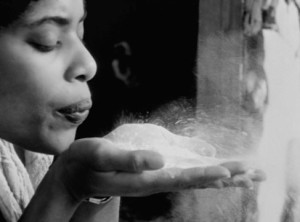
Streams of Memories
–
Downloads
Streams of Memories was an online screening programme curated by Culture Art Society (CAS) at the culmination of their research residency with The Showroom at Metroland Studio, Kilburn, 2021.
The programme presented five experimental short films by S. Pearl Sharp, Barbara McCullough, Kym Ragusa, Omah Diegu, and Martina Attille; exploring the ways in which these filmmakers weave and unravel stories, fears and hopes across the African continent and diaspora, between generations and over time.
Schedule:
S. Pearl Sharp, Back Inside Herself, 1984, 4 minutes
Barbara McCullough, Water Ritual ## 1: An urban rite of purification, 1979, 6 minutes
Kym Ragusa, Demarcations, 1992, 5 minutes
Omah Diegu, African Women, U.S.A., 1980, 20 minutes
Martina Attille, Dreaming Rivers, 1988, 30 minutes
Each film touches upon the sociality and sensuality of gathering; heightened by being shown together as part of this programme in company and dialogue with one another. S. Pearl Sharp’s film Back Inside Herself, 1984 is a visual poem on self-invention and shows a Black woman finding her own sense of self while rejecting white hegemonic societal expectations of who she should be and how she should behave. Barbara McCullough extends the poetics of cinema in Water Ritual ## 1: An urban rite of purification, 1979, to enact the spiritual and psychological journey of a Black woman as she (re)connects with the African continent and the Caribbean on a cosmological level. A different sense of wandering and wondering is conveyed in Kym Ragusa’s Demarcations, 1992, through mediations on how the trauma of rape leaves its inflictions on the body yet does not determine self-identity. African Women, U.S.A., 1980, by Omah Diegu further explores misogynoir and transnational complexities by addressing family, labour and gender power relations. Dreaming Rivers, 1988, by Martina Attille reflects and recalls the ghosts of love, loss and kinship.
Together these short films pull, release and upsurge the histories, experiences and lives of Black women. Rather than merely presenting how they are viewed, particularly by the white gaze, these films - or memories - intervene in dominant Western cinematic aesthetics and redirect vision towards how Black women themselves view the structures, relations and intimacies of their lives. These five filmmakers look at the camera not for recognition, but to confront and impose their looking onto and against the camera.
It is this ambivalence to visibility and wildness to capture that led CAS to accompany the screening programme with the essay Why Black Cinema?, 1987, by the late poet and social activist Toni Cade Bambara. This text and the film programme was discussed in an accompanying reading group which was held at The Showroom on Saturday 29 January 2022. Click here for more details. The reading group extended CAS’s ongoing work towards both exploring and hosting discussion framed by the intersectional relations between contemporary art practice and literary theory.
The films Demarcations, 1992, and African Woman, U.S.A., 1980, contain references to rape, and so viewer discretion was advised.
The Streams of Memories film programme was discussed in an accompanying reading group held at The Showroom on Saturday 29 January 2022. Click here for further details.
With thanks to each of the filmmakers and to distributors Cinenova, Third World Newsreel, UCLA Film Archive and LUX.